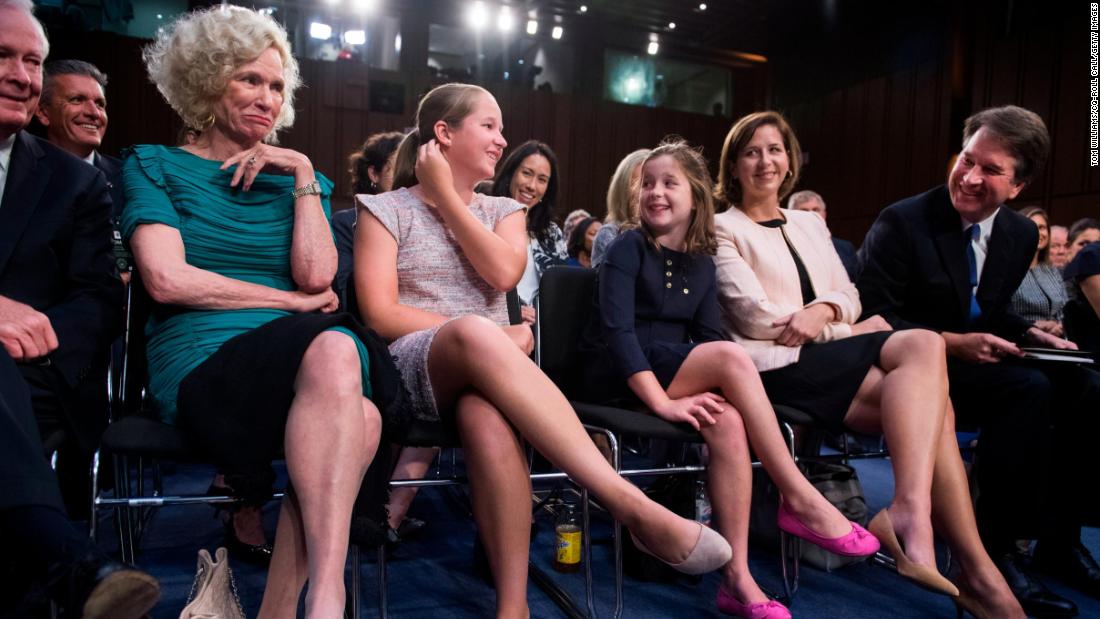Reading Time: 5 minutes
Whether viewers read them as sincere or not, we know the answers in the Fox News interview Brett Kavanaugh did with his wife must have been heavily scripted.
Kavanaugh and his handlers undoubtedly formulated a strategy to feature his wife alongside him in their joint interview.
This choice is an extension of a strategy we have seen even before the
accusations against Kavanaugh emerged late in the confirmation process. Kavanaugh stands poised to be the justice who will cement an anti-abortion rights court. With images of him with his wife, daughters, law clerks, and young female basketball players, he is framed as a man who supports women and their futures. (Kavanaugh has vigorously denied the allegations.)
They were front and center in the hearings — a visual counterargument to the idea that women’s lives and bodies are not safe in his hands. Now that some women have accused him of assaulting them, the images are even more important. The happy, shining faces of these teenage girls are meant to inspire trust.
Images sell the idea that these girls have been safe in his hands. How could anyone imagine that this man, trusted and loved, would hurt them? And if he has not hurt them, how could he have hurt any other young woman?
He is a man who stands accused of sexual assault —
defined by the US Department of Justice as any unwanted sexual contact or behavior that occurs without the consent of the recipient. And the pictures, originally staged for other reasons, now could be portrayed as evidence.
Ashley Kavanaugh, his daughters, clerks and the basketball players are all character references to refute the charges against him. They are not just props. The pictures are also, in a way, his alibis.
This hinges on a largely incongruous idea that people treat everyone in their lives the same, across time and contexts.
The television show “The Good Wife” began similarly, with an image of stoic wifely support, and much of the show turned on the importance of title character Alicia Florrick publicly supporting her husband in his career and forgiving him for both his relationship with a prostitute and the possible criminal activities he committed while in office.
She was his character alibi — if she forgave and believed in him, the public would support him too. For who, in this logic, would know him better than his wife?
For a long time, and especially since the Kavanaughs’ interview, I have thought a great deal about “The Good Wife,” as well as the number of real wives who function as marital alibis for men accused of both extramarital affairs and sexual assault. In both cases, the women in a man’s life are the character alibis.
In the case of an extramarital affair, they are essential to the politician’s possible rehabilitation because the wife is the primary victim.
But in the latter case, when allegations of misconduct or assault emerge, the wife becomes a victim too — in ways that are messier.
During his 1991 confirmation hearings, Clarence Thomas
said, “I can’t tell you what my wife has lived through or my family.” I am sure Virginia Thomas was indeed suffering, just as Ashley Kavanaugh is now. That this accusation hurts her and her children is undoubtedly true.
But it is also the case that this is a way of rhetorically displacing the victim — if the wife and family are the injured parties, the woman who has brought forth the charge is understood as victimizing a woman and children too.
A great deal of empirical evidence has shown that
people who commit acts of intimate and sexual violence
often do it
more than once. But it is also true that people can commit horrific acts of violence against others and still be good to those they love. The psychological and cultural inability to come to terms with that reality results in many victims being disbelieved and treated quite badly.
Whatever the outcome of the hearings and evaluation of the various testimonies, we need to resist the impulse to believe that people cannot live compartmentalized lives, across time and space. This is a hard lesson. Because if we trust and believe in someone who can do horrible things, it often makes us question ourselves.
Confluence Daily is the one place where everything comes together. The one-stop for daily news for women.













